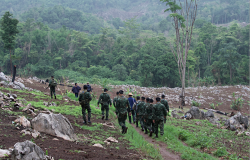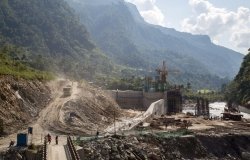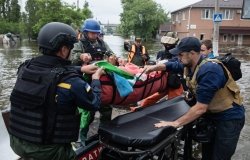Russian Environmental Activist Warns of Russian Radioactive Threat
by Geoffrey D. Dabelko
The legacy of radioactive military waste produced by the Russian Northern Fleet threatens the region surrounding the fleet's bases and dumping grounds in Northwest Russia and the Barents Sea, according to former Russian Navy submarine captain and environmental activist Alexandr Nikitin. Nikitin, now with the Bellona Foundation, a Norwegian environmental NGO, visited the Woodrow Wilson Center on August 23 and spoke with staff about the recent sinking of the Kursk nuclear submarine as only the latest radioactive threat in the region.
Nikitin pointed out that of the 110 Russian nuclear submarines no longer in service, 72 still have fuel in their reactors, and 30 of those are in critical condition, in danger of sinking. As with the Kursk today, the threat stems from water breaking the hermetic seal around the reactors and radionuclides escaping into the surrounding environment.
For the past five years, Nikitin repeatedly had been charged with treason for passing state secrets for his role in preparing the 1996 Bellona Foundation report The Russian Northern Fleet: Sources of Radioactive Contamination. Nikitin and his two Norwegian co-authors maintain that the data-rich report contained unclassified information from open sources.
On September 13, 2000, the five-year court battle finally ended when the Russian Supreme Court dropped all charges against Nikitin. The prosecution used up all of its appeals and so Nikitin, who spent a year in prison awaiting his initial trial, is finally free.
Nikitin's legal troubles reflected increasing efforts by the Russian government to heighten secrecy in Russia and discourage those gathering environmental data. Russian President Vladimir Putin has suggested that environmental groups provide convenient cover for Western intelligence agencies. In court, Nikitin contended that the Russian government not only violated his individual rights, but systematically deprived the Russian public of the rights to access of information and to seek redress for environmental catastrophes.
As environmental and human rights issues have grown intertwined in recent years in Russia, Nikitin has established the St. Petersburg Environmental Rights Centre with support from Norwegian and Russian colleagues. Now in coalition with other groups throughout Russia, this Centre seeks to advance the collection of environmental data and protect those who compile it. The Centre and the recently formed Environment and Human Rights Coalition provide legal advice to communities and individuals concerning environmental activities, gather and analyze environmental data throughout Russia's regions, and train other lawyers in the effective strategies developed in the course of the Nikitin case.
--Updated September 13, 2000
Related Program

Environmental Change and Security Program
The Environmental Change and Security Program (ECSP) explores the connections between environmental change, health, and population dynamics and their links to conflict, human insecurity, and foreign policy. Read more










